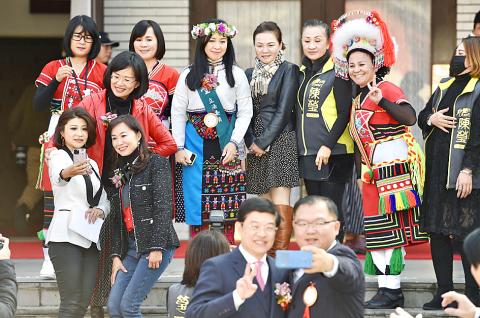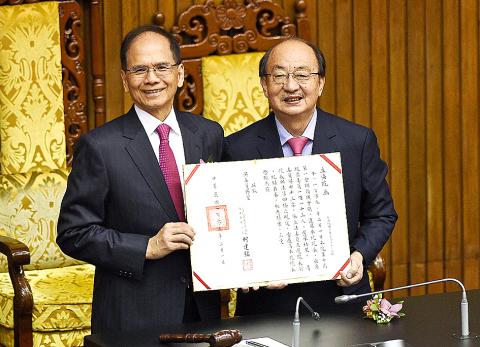Former premier Yu Shyi-kun (游錫堃) was yesterday elected legislative speaker by the Democratic Progressive Party’s (DPP) caucus, while DPP Legislator Tsai Chi-chang (蔡其昌) was elected deputy speaker for a second term.
The legislative speaker election was held at the Legislative Yuan in Taipei after the new lawmakers were sworn in.
Yu, a first-time legislator, garnered 73 votes, while rival Lai Shyh-bao (賴士葆) of the Chinese Nationalist Party (KMT) won 36 votes.

Photo: George Tsorng, Taipei Times
KMT Legislator Yang Chiung-ying (楊瓊瓔) — who was the party’s deputy legislative speaker candidate — Nonpartisan Solidarity Union (NSU) Legislator May Chin (高金素梅) and rookie DPP Legislator Lai Pin-yu (賴品妤) each earned one vote, while a spoiled vote was also cast.
After last month’s legislative elections, the DPP has 62 seats, the KMT has 38, the Taiwan People’s Party (TPP) has five and the New Power Party (NPP) has three, while the NSU and Taiwan Statebuilding Party each have one.
Independent legislators Fu Kun-chi (傅崐萁), Freddy Lim (林昶佐) and Chao Cheng-yu (趙正宇) make up the remaining seats.

Photo: Chen Chih-chu, Taipei Times
In the afternoon’s deputy legislative speaker election, Tsai secured 65 votes, beating out Yang, TPP Legislator Lai Hsiang-lin (賴香伶) and NPP Legislator Claire Wang (王婉諭), who won 36, five and three votes respectively, while KMT Legislator Sra Kacaw and Wen Yu-hsia (溫玉霞) each got one vote.
In Yu’s inauguration speech, he said he hoped Taiwan would become a “normalized” nation, in which the legislature would serve as the pinnacle of its political system, and aims to improve how it functions.
He said he would push to lower the age for people seeking legislative office to break barriers between generations and promote cooperation and prosperity between people of all ages.
Yu said he would encourage his colleagues to work in tandem with government agencies to secure free-trade agreements and establish official ties with like-minded democracies, such as the US, Japan, EU, Australia and Canada, against the backdrop of a US-China trade dispute, which could tilt international relations in Taiwan’s favor.
Taiwan should use its soft power and critical strategic location in the Indo-Pacific region to capitalize on the opportunities that have presented themselves amid the trade dispute, he said.
This, coupled with a robust economy and a strong national defense system, would make Taiwan a small but powerful nation, he added.

The CIA has a message for Chinese government officials worried about their place in Chinese President Xi Jinping’s (習近平) government: Come work with us. The agency released two Mandarin-language videos on social media on Thursday inviting disgruntled officials to contact the CIA. The recruitment videos posted on YouTube and X racked up more than 5 million views combined in their first day. The outreach comes as CIA Director John Ratcliffe has vowed to boost the agency’s use of intelligence from human sources and its focus on China, which has recently targeted US officials with its own espionage operations. The videos are “aimed at

STEADFAST FRIEND: The bills encourage increased Taiwan-US engagement and address China’s distortion of UN Resolution 2758 to isolate Taiwan internationally The Presidential Office yesterday thanked the US House of Representatives for unanimously passing two Taiwan-related bills highlighting its solid support for Taiwan’s democracy and global participation, and for deepening bilateral relations. One of the bills, the Taiwan Assurance Implementation Act, requires the US Department of State to periodically review its guidelines for engagement with Taiwan, and report to the US Congress on the guidelines and plans to lift self-imposed limitations on US-Taiwan engagement. The other bill is the Taiwan International Solidarity Act, which clarifies that UN Resolution 2758 does not address the issue of the representation of Taiwan or its people in

US Indo-Pacific Commander Admiral Samuel Paparo on Friday expressed concern over the rate at which China is diversifying its military exercises, the Financial Times (FT) reported on Saturday. “The rates of change on the depth and breadth of their exercises is the one non-linear effect that I’ve seen in the last year that wakes me up at night or keeps me up at night,” Paparo was quoted by FT as saying while attending the annual Sedona Forum at the McCain Institute in Arizona. Paparo also expressed concern over the speed with which China was expanding its military. While the US

DEFENDING DEMOCRACY: Taiwan shares the same values as those that fought in WWII, and nations must unite to halt the expansion of a new authoritarian bloc, Lai said The government yesterday held a commemoration ceremony for Victory in Europe (V-E) Day, joining the rest of the world for the first time to mark the anniversary of the end of World War II in Europe. Taiwan honoring V-E Day signifies “our growing connections with the international community,” President William Lai (賴清德) said at a reception in Taipei on the 80th anniversary of V-E Day. One of the major lessons of World War II is that “authoritarianism and aggression lead only to slaughter, tragedy and greater inequality,” Lai said. Even more importantly, the war also taught people that “those who cherish peace cannot